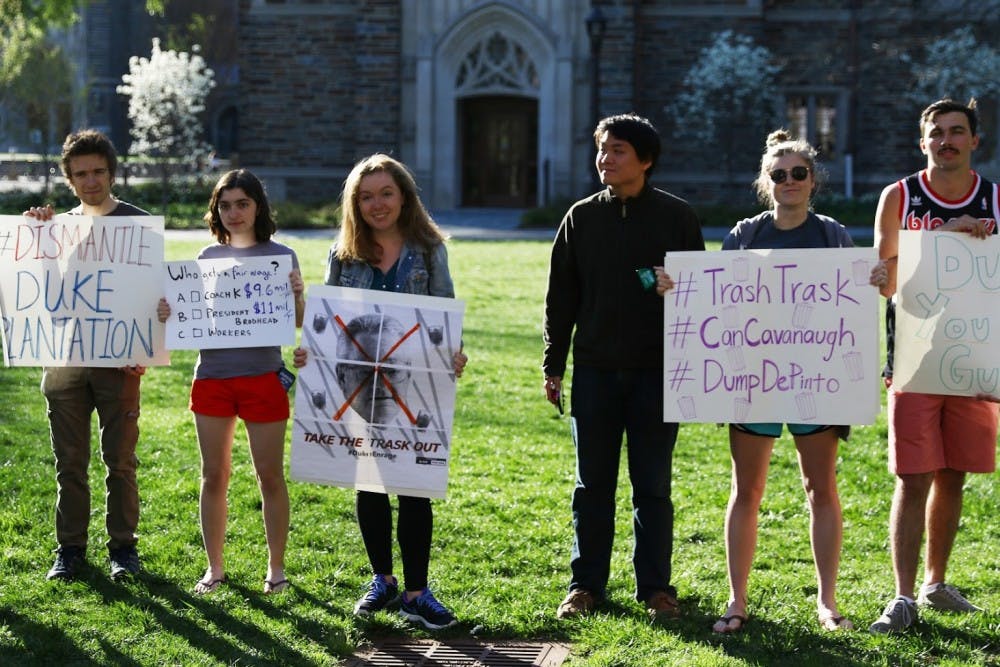Duke Students & Workers in Solidarity organizers have prioritized their demands but plan to continue applying pressure to administrators during the Fall semester.
The group, which has advocated for better treatment of workers and racial issues on campus since this Spring, will focus its efforts on two central goals. The first is raising the minimum wage of Duke employees and contractors to $15 per hour, and the second is an independent investigation of Parking and Transportation Services, the Office of Institutional Equity and the Duke University Police Department.
Their activism will take a variety of forms, said senior Lara Haft—one of the nine students who occupied the Allen Building for a week last April.
“I think it’s pretty obvious to me and most people that I’ve talked to that we are coming in on a really strong position and the Duke administration knows that we are a tour de force of employees, students and faculty that are organized and working together,” Haft said.
Administrators announced earlier this month that Duke would raise its minimum wage for employees working at least 20 hours per week, 36 weeks a year to $13 per hour by Jan. 1, 2017.
Although Vice President for Administration Kyle Cavanaugh noted at the time that the increase was part of an annual review, Haft said it is clear that DSWS’ work was influential in the decision. The group also wants the minimum wage to follow the path set forth by the City of Durham to reach $15 an hour by July 2018. Last year, the group issued revised demands asking for a $15 per hour wage by July 2019.
There has been no contact between administration and DSWS members this summer, said Michael Schoenfeld, vice president for public relations and government relations. Haft confirmed Schoenfeld’s statement.
Looking back
Haft said the group has looked to past organizing efforts on Duke’s campus for inspiration.
“There’s this pretty long history at Duke of students, faculty and employees all organizing together to improve Duke’s labor conditions with a really big peak starting in the late 1960s and with a lot going on in the late 90s and early 2000s and also some pretty significant organizing going on in the late 70s,” Haft said. “I really see us being situated within that lineage.”
DSWS rose to prominence last Spring after a group of nine students occupied the second floor of the Allen Building from April 1 to April 8. The students launched their protest in response to a report in The Chronicle that Executive Vice President Tallman Trask hit a contract employee with his car and allegedly used a racial slur, and to a second article outlining allegations of a hostile work environment in the PTS department.
As the sit-in began, protestors inside and outside the building listed seven demands. These included the firing of Trask—who later issued an apology—along with Cavanaugh and Carl DePinto, director of PTS, as well as several targeting working conditions at the University. An eighth demand for amnesty from sanctions for protesting was later added and granted during the third day of the occupation.
Administrators shut down offices in the Allen Building and classes were relocated as negotiations with the nine students inside stalled.
Toward the later days of the protest, President Richard Brodhead announced the formation of a steering committee that would make recommendations for “addressing issues of respect, civility, wages and inclusiveness for staff.” Later that evening, DSWS issued an updated list of demands, outlining in greater specificity goals for increased wages and an independent review of working conditions at Duke.
On the last day of the sit-in, the students emerged from the building after a speech by Rev. William Barber II,president of the state's chapter of the NAACP. At the time, protestors said their organizing would continue into the summer and the next semester.
Looking ahead
Haft noted that DSWS is not satisfied with the administration’s efforts.
The task force set up by Brodhead does not include any members of DSWS and lacks transparency, she said. The group is also concerned that the minimum wage increase announced by the University will not be given to some groups of workers, including seasonal and part-time employees.
Instead, they will focus on two demands this semester: covering more classes of workers under the University’s revised minimum wage along with greater financial transparency, as well as an independent review of PTS, OIE and DUPD.
“You’ll see that they fall really nicely with our seven demands and are quite strategic as far as things we know we can win, and know we can win this semester,” Haft said, noting the group actively discussed their goals during the summer.
DSWS will spread two zines on campus, she said. One titled, “We know we’ve been here,” will examine earlier activism at Duke. The other, titled “(Dis)Orientation” will be forward-looking, she noted.
They will also launch several programs during “(Dis)Orientation Week”—a series of events DSWS plans to hold the weekend after Orientation Week—which will be targeted at educating new students.
DSWS also worked this summer to involve more Durham organizers.
“Duke is the largest employer in Durham, and the Durham city government is already on a $15 minimum wage track. Duke is the target of pretty much every progressive in Durham, so we have a lot of outside reinforcements,” Haft added.
Get The Chronicle straight to your inbox
Signup for our weekly newsletter. Cancel at any time.
Adam Beyer is a senior public policy major and is The Chronicle's Digital Strategy Team director.

